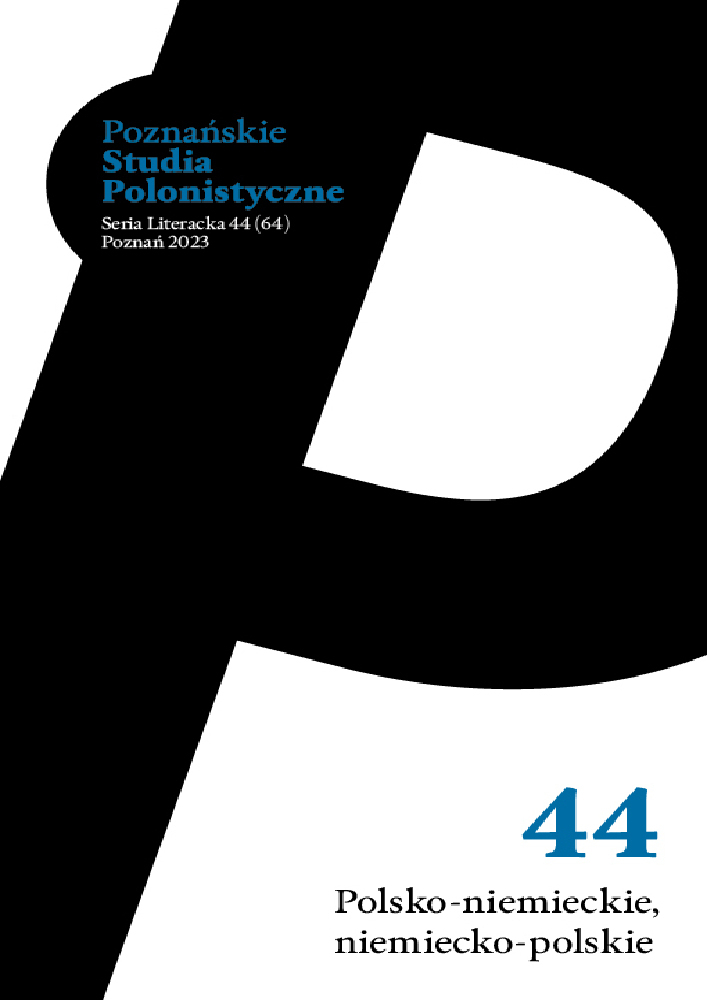Abstract
The aim of the article is to show the influence of Friedrich Nietzsche’s philosophy on literature. The category of borderland is primarily of cultural and symbolic significance. Wojciech Karpiński shows the way of Friedrich Nietzsche’s thought in discovering his eidos. The German philosopher lived a life between good and evil, joy and suffering, falling and rising upwards, and writers were inspired by this attitude.
References
Arystoteles (1990), Fizyka, w: tegoż, Dzieła wszystkie, przeł. Kazimierz Leśniak, PWN, Warszawa.
Bachtin Michaił (1997), W stronę filozofii czynu, przeł., wstęp i przyp. Bogusław Żyłko, słowo/obraz terytoria, Gdańsk.
Deleuze Gilles (1965), Nietzsche. Sa vie, son oeuvre avec exposé de sa philosophie, Presses Universitaires de France, Paris.
Heidegger Martin (1999), Ku rzeczy myślenia, przeł. Krzysztof Michalski, Janusz Mizera, Cezary Wodziński, Aletheia, Warszawa.
Heidegger Martin (2006), Identität und Differenz, Vittorio Klostermann, Frankfurt am Main.
Karpiński Wojciech (2017), Szkice sekretne, Fundacja Zeszytów Literackich, Warszawa.
Kasperski Edward (2010), Kategorie komparatystyki, Wydział Polonistyki Uniwersytetu Warszawskiego, Warszawa.
Landsberg Hans (1902), Friedrich Nietzsche und die Deutsche Litteratur, Hermann Seemann Nachfolger, Leipzig.
Marti Roland (2000), Grenzkultur – Mischkultur?, Veröffentlichungen der Kommission für Saarländische Landesgeschichte und Volksforschung, Saarbrücken.
Skarga Barbara (2005), Kwintet metafizyczny, Universitas, Kraków.
Skarga Barbara (2009a), Tercet metafizyczny, Znak, Kraków.
Skarga Barbara (2009b), Tożsamość i różnica. Eseje metafizyczne, wyd. 2, Znak, Kraków.
Sobeski Michał (1912), Interludia z pogranicza sztuki i filozofii, Księgarnia S.A. Krzyżanowskiego, Kraków.
Stróżewski Władysław (2002), Wokół piękna. Szkice z estetyki, Universitas, Kraków.
License
Copyright (c) 2023 Barbara Trygar

This work is licensed under a Creative Commons Attribution-NoDerivatives 4.0 International License.
Authors
Authors of texts accepted for publication in „Poznańskie Studia Polonistyczne. Seria Literacka” are required to complete, sign and return to the editor's office the Agreement for granting a royalty-free license to works with a commitment to grant a CC sub-license.
Under the agreement, the authors of texts published in „Poznańskie Studia Polonistyczne. Seria Literacka” grant the Adam Mickiewicz University in Poznań a non-exclusive, royalty-free license and authorize the use of Attribution-NoDerivatives 4.0 International (CC BY-ND 4.0)Creative Commons sub-license.
The authors retain the right to continue the free disposal of the work.
Users
Interested Internet users are entitled to use works published in „Poznańskie Studia Polonistyczne. Seria Literacka” since 2016, for non-commercial purposes only, under the following conditions:
- attribution - obligation to provide, together with the distributed work, information about the authorship, title, source (link to the original work, DOI) and the license itself.
- no derivatives - the work must be preserved in its original form, without the author's consent it is not possible to distribute the modified work, such as translations, publications, etc.
Copyrights are reserved for all texts published before 2016.
Miscellaneous
Adam Mickiewicz University in Poznań retains the right to magazines as a whole (layout, graphic form, title, cover design, logo etc.).

